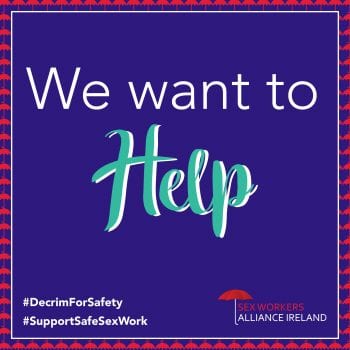
“The long-awaited review of the Review of Part 4 of the Criminal Law (Sexual Offences) Act 2017 law governing sex work is underway. This is an opportunity for policymakers in this country to listen to current sex workers about how the decriminalisation of sex work will keep everyone safer, including those who have been trafficked” says Kate Mc Grew, director of the Sex Workers Alliance Ireland (SWAI) and current sex worker.
She continues “Globally, sex work prohibitionists have been successful in conflating all sex work as trafficking. This, combined with the fact that other forms of labour draw more trafficking victims into Ireland, has meant that resources are being misspent on a strategy of criminalising the purchase of sex that has not been proven to stop trafficking. This conflation has also meant that consenting sex workers working together for safety have been caught up in so-called brothel raids. In fact, the only people who have been arrested for brothel-keeping in Ireland have been young, migrant women. The Sexual Offences law 2017 is being applied in a racist way, which has been noted by IHREC.”
“US State Dept Trafficking in Person’s Report, released earlier this month, highlights how Ireland struggles to identify victims of trafficking. No one has been arrested for trafficking in Ireland since 2013. In fact, our laws have caused a 92% increase in crime against sex workers. What use are these laws, if not to protect people?
The crime of sex trafficking is despicable and we in SWAI condemn it in the strongest way. It’s unhelpful to separate out sex trafficking from other forms of labour trafficking. Central to anti-trafficking strategies in other sectors are workers ability to organise, unionise and report. Exploitative working conditions such as those experienced by people who have been labour trafficked in other sectors has led to the loss of limbs, and the report notes that ‘The government has reported the problem of forced labor in the country is growing’.
The best tool the state and Gardaí have to find trafficked victims is un-utilised and even ostracised: sex workers. Criminalisation of any aspect of sex work drives sex work underground, making it more difficult to finding those vulnerable to exploitation, including trafficking victims. Data shows that sex workers are extremely unlikely to report to the Gardaí after being victims of a crime. Other avenues of reporting and identification should be available to trafficking victims as recommended by this report. A firewall is needed between immigration and sex crimes so that undocumented people feel safe to report crimes against them without fear of deportation.
Prevention of trafficking is key to reducing its prevalence. Oppressive border controls and lack of legal migration avenues, as well as poverty and addiction increase trafficking. We must reallocate some of the resources spent campaigning against sex work and “awareness-raising” of trafficking into prevention and poverty alleviation.
Now is not the time to increase oppressive laws in the hopes that this will deter traffickers. In fact, the pandemic and the review are opportunities to step back and reassess our laws and their failures. Pouring money into anti-sex work campaigns has not been successful, let us reimagine our anti-trafficking endeavours to include sex workers who are on the ground and are best placed to identify and call-out exploitation in the industry. Anti-trafficking laws are often used as a tool of immigration instead of care and refuge. The reality is that in Ireland many more sex workers have been arrested than clients. Workers are often asked to leave the country or face prosecution. This flies in the face of the care and the rights-based approach that the state is supposed to show.
Decriminalisation of sex work is key and is a stance supported by PICUM Members (Platform for International Cooperation on Undocumented Migrants, International Labour Organization and The Global Alliance Against Traffic in Women (GAATW). It does not decriminalise the crime of trafficking or coercion, but it moves sex work out of its quasi-legal state and empowers sex workers with labour rights and pathways to justice. Sex workers want to be allies, and we are best placed to do so. But the law does not respond to the circumstances of deep poverty, domestic violence, homelessness, and drug mis-use that lead some to becoming susceptible to trafficking.”
